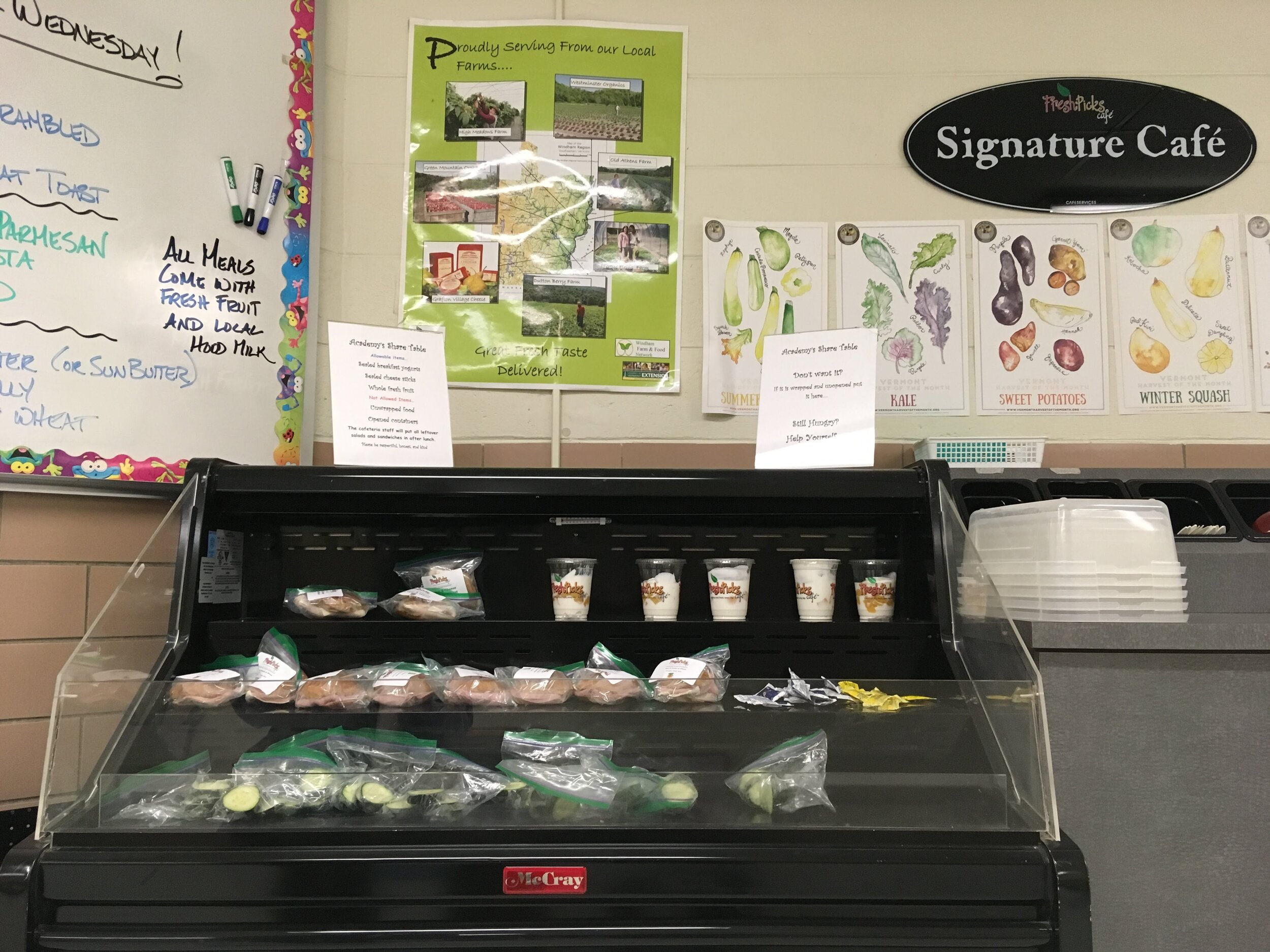Food Connects begins a two-year project aimed at reducing food waste and increasing food access in local schools.
Food Connects has worked with schools for over 10 years to support Farm to School programs that bring together the cafeteria, classroom, and community. Oftentimes, when working with Food Service Directors, we focus on the procurement and preparation of local food in school cafeterias. Until now, less attention was given to food waste and food recovery, despite it being an essential part of Vermont’s food system. Thanks to the support of a two-year $55,550 grant from the Claneil Foundation, we now have the capacity to greatly build upon our current efforts to address food waste and better support our partners.
As a community, our awareness of the urgency and magnitude of climate change has grown. Farm to School programming is already linked to sustainability education in the classroom and carbon reduction in the cafeteria through local food procurement. We want to strengthen our commitment to these efforts and our work in cafeterias is the prime location for this increased focus. Reducing food waste and increasing food access are two sides of the same problem—this project supports the work we’ve done around trauma-informed approaches to Farm to School. All of which led us to the Claneil Foundation, whose Critical Issue Fund is currently focused on food waste.
Share Cooler at Academy School.
We’re excited to work with Food Service Directors to tap into the captive audience each cafeteria presents. Some schools we work with have already taken big steps to reduce food waste, notably Seed2Tray—Windham Central Supervisory Union’s nutrition program—and the Windham Southeast School District. At Seed2Tray, Chris Parker and his staff repackage leftover food to give students the option of taking an additional meal home with them. In the WSESD, share coolers are a common sight in cafeterias and Putney Central School replaced milk cartons with reusable cups and a milk dispenser.
Despite the promising progress, we anticipate obstacles along the way. The biggest of which is that change is often slow to happen and difficult to enact. This is especially true in middle and high schools. With fewer daily routines and more student autonomy, it becomes crucial to reach students with positive messaging and clear steps they can take to be a part of the solution. We anticipate student environmental groups in secondary schools to be our partners in implementing some of these changes. Research indicates that the longest-lasting interventions are those focused on teachers and staff in the school (as opposed to students). As the main implementers of new systems and the setters of culture in schools, co-opting school staff will be essential. We’ll need to ensure that our best practices are streamlined and easy for busy staff to incorporate into their daily routines.
With these potential challenges in mind, over the next year, we will work closely with schools to refine their current practices and pilot new ones. By the end of this stage of the project, we will engage with at least ten schools in southeast Vermont and the Monadnock Region of New Hampshire. The list of potential interventions includes share coolers, repackaging meals, composting systems, school-based food shelves, improving cafeteria environments, and continuing to improve meal quality. We’re also excited to discover new interventions along the way!
In the second phase of the project, we’ll refine this list and highlight the three best practices which have the largest impact relative to their ease of implementation. We will collaborate with state agencies to make sure the practices are aligned with relevant regulations and interview staff from pilot schools to better understand their perspectives. Finally, we’ll take all this information and create a toolkit and workshop to be shared with stakeholders throughout New England.
What I’m most excited about regarding this new project is how it connects strongly with the work we already do in schools and approaches that work through a new lens. I’m sure that in addition to new food waste reduction strategies, new interventions and practices will be uncovered that support other aspects of Farm to School programming. Collaboration is an integral part of this project. I’m looking forward to deepening the relationships we already have with our partners and beginning work with new stakeholders as well.
By Conor Floyd, Food Connects Farm to School Program Manager
We would like to work with you!
Are you a teacher, administrator, school nutrition staff, or parent in southeast Vermont or the Monadnock Region and would like to see your school take up this work with Food Connects?
Does your school have innovative practices in food waste reduction and increasing food access?

